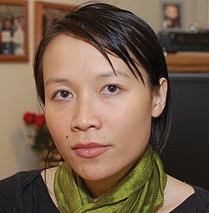
Dr. Julie Pham
By Dr. Julie Pham
For Northwest Asian Weekly
If every vote counts, why are political candidates doing so little to reach out to Washington state’s significant minority communities?
Many ethnic media outlets in the state are asking this very question. While mainstream media is on the decline, ethnic media is growing to meet the needs of new Americans. Racial and ethnic minorities comprise more than 20 percent of the 6.7 million Washingtonians, and the majority of those consume news from ethnic media.
Many ethnic media editors and publishers say politicians are doing a disservice to themselves by overlooking the huge numbers of ethnic voters who could make a difference.
“I’ve seen political candidates come and gain an audience with our tribal leaders. Then they leave,” said Ronnie Washines, managing editor of the Yakama Nation Review and former president of the Native American Journalists Association. “We don’t hear from them again, regardless of whether they win or lose. Until the next election cycle, that is.”
Ethnic media organizations are small, often micro, businesses. Most of them distribute their news for free, and their income is entirely based on advertising. Washines said he passes out his business cards to candidates and invites them to consider advertising, but “nothing has ever come of it.”
The Yakama Nation Review is not alone. Of the 33 ethnic media organizations surveyed for this article, 11 said they received no political campaign advertising. More than half received less than $500 in campaign ads in 2009.
Yet Washington state political candidates and committees invest a significant amount of money in advertising.
According to the state’s Public Disclosure Commission, political expenditures and contributions registered as “ad” or “media” buys totaled almost $3.4 million in 2009.
Yet ad revenue for 33 ethnic media organizations totaled less than $25,000. In other words, only 0.7 percent of the entire political campaign advertising budget spent in 2009 was set aside to reach Washington’s minority communities.
Most ethnic media organizations are produced in-language and serve linguistically isolated populations. Statewide, 7.6 percent of residents report that they speak English “less than very well”; in King County, that figure is 10.8 percent. Many of these people rely on ethnic media for their news.
Money talks. These figures show the extent to which political candidates and committees grossly undervalue the role played by ethnic media in building bridges between local society and ethnic communities.
Campaign strategists may argue that most political campaign advertising goes to broadcast TV and radio, and perhaps Washington’s ethnic media gets a small share of advertising dollars because most of their outlets are print.
Univision Seattle, which reaches 320,000 Hispanics, reported that it received no political campaign advertising last year and don’t expect any this year, either. David Cho, president of AAT TV, the only free-to-air multilingual Asian TV network in Western Washington, said his station has not aired political campaign ads since 2007 because “recent offers were $500 or less. We kindly declined to take the money, since the revenue is too low.”
Yet case studies show advertising in ethnic media has a high return on investment. In California, GOP gubernatorial candidate Meg Whitman has succeeded in cutting Democrat candidate Jerry Brown’s lead among Hispanics from 23 percentage points in January to just 3 points in September, according to the most recent Field Poll. Her secret? Advertising in Spanish-language media.
Do Washington’s politicians choose not to invest advertising money in reaching out to minorities because they think these communities don’t vote in large enough numbers to merit the expense? Or is it because they take these communities for granted? Either way, they are missing important opportunities to engage with a significant number of Washington’s voters.
It is true that Asians, Hispanics, and blacks have lower voter registration than whites in Washington by 20 to 25 percentage points. Considering how little politicians do to engage minority communities, it is surprising the gap is not larger.
But there is great untapped potential in Washington to mobilize minority voters. Washington ranks fourth among states in the registration of Asian voters and eight in the registration of Hispanics—surprisingly high, considering that voting materials are only published in English and Mandarin. After the 2010 Census numbers are counted, election officials predict that voting materials will also be published in Spanish, Korean, and Vietnamese. Politicians should start cultivating these constituencies now through their media.
Perhaps politicians believe certain ethnic communities have an established political disposition. This misconception assumes ethnic media do not strive for the same objectivity upheld in mainstream media.
“It doesn’t matter if they’re Democrat or Republican—our readers just want to know who these candidates are,” said Miguel Blanco, the publisher of El Aguila, a new bilingual Spanish-English publication that serves the south Puget Sound area.
Members of both parties, and even minority candidates, are guilty of not engaging ethnic media as they would with mainstream media.
Some politicians may say their campaign strategists determine their advertising dollars and meeting schedules. Ultimately, however political candidates set their own priorities. The extent to which candidates work toward closing the information gap between mainstream and minority communities while they campaign may predict their actions if elected into office.
Ethnic media organizations are not blameless, either. Many of the ethnic media organizations surveyed for this article admitted that limited time or lack of knowledge inhibited them from aggressively pursuing campaign advertising or interviews with political candidates. Just as political campaigns need to value the role of ethnic media, ethnic media must work harder to make themselves known to political campaigns. ♦
Julie Pham, PhD, is the founder and director of www.seabeez.com and monitors ethnic media in the Northwest for New America Media. She is also managing editor of Northwest Vietnamese News/Người Việt Tây Bắc



